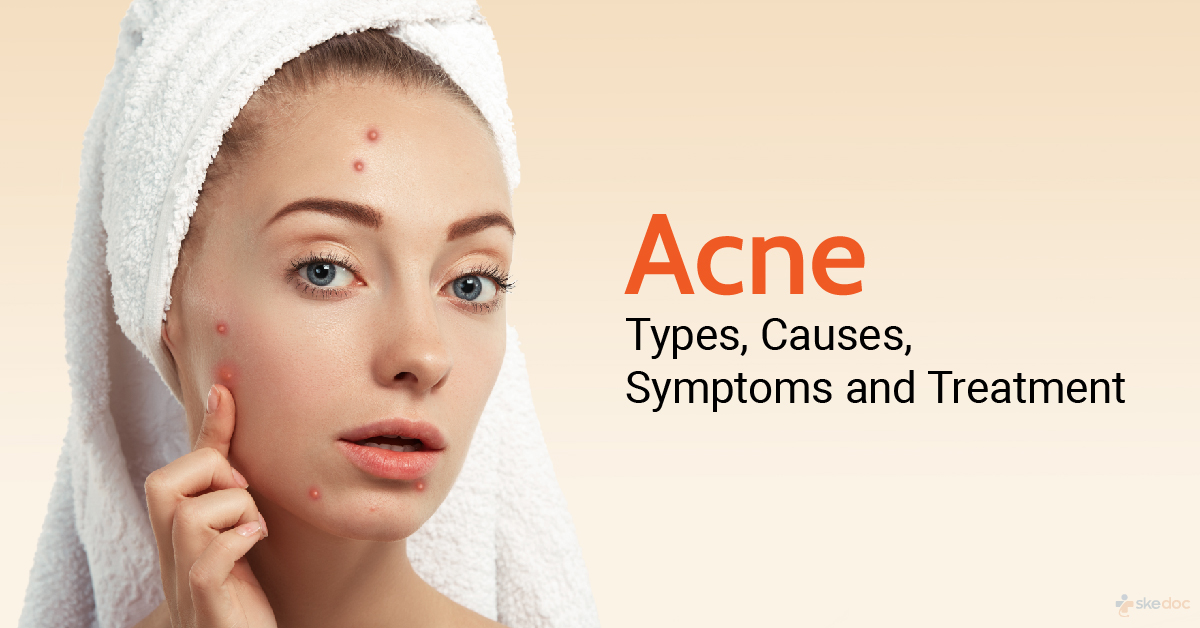Allergy
Blood Diseases
Bone & Joints
Brain
Cancer
Child Care
Cosmetic Surgery
Diabetes
Endocrinology
ENT
Eye
Gen Medicine
General Surgery
Heart
Kidney
Lifestyle
Liver & Digestive
Lung
Men’s Health
Mental health
Physiotherapy
Rheumatology
Skin and hair
Sleep Disorders
Spine
Transplant
Women Health
Thyroid
Vascular Surgery
Acne: Causes, Symptoms, Prevention and Treatment

What is Acne?
Acne problem is one of the most common skin problems that have the tendency to turn chronic and results mainly when a hair follicle and its accompanying oil-producing sebaceous gland become blocked with dead skin cells and oil, leading to the development of symptoms such as red, raised bumps on the skin. It mainly affects the face and forehead, but can also affect the chest, upper back, and shoulders.
Symptoms of acne?
Acne or in medical terms Acne vulgaris can present with non-inflammatory lesions, inflammatory lesions, or a mixture of both inflammatory and non-inflammatory lesions. Non-inflammatory lesions can be either closed comedones (whiteheads) or open comedones (blackheads). Inflammatory lesions can be Papules which are small raised red and tender bumps on the skin, Pimples or Pustules which are small raised red and tender bumps on the skin with pus at their tips, Nodules which are large, hard, and painful lumpy lesions under the skin, and Cystic Lesions which are large, very painful, pus-filled lumpy lesions under the skin.
Depending on the severity of the condition acne can be clinically classified as
Comedonal Acne:
In this type of acne, comedones, i.e., whiteheads or blackheads are present, but there are no inflammatory lesions such as pimples (papules) or pustules present.
Mild Acne:
In this type of acne, comedones are present along with a few pimples and/or pustules
Moderate Acne:
In this type of acne, there are more comedones, inflammatory pimples, and pustules when compared to mild acne.
Severe Acne or Nodulo Cystic Acne:
This a severe form of acne in which comedones, many large inflammatory nodules, and cystic lesions under the skin that are more than 4-5mm in diameter.
Causes of acne:
According to the best acne specialists nearby, the main reasons for the development of acne include excessive production of oil by the sebaceous glands, blockage of the base of the hair follicle with dead skin cells, and the excess oil produced by the oil gland next to it, increased bacterial activity in the region, and the development of inflammation. The best skin specialists in Hyderabad for acne further explain that the blocked hair follicle may bulge out leading to the development of a whitehead, or it may remain open to the surface and present as a blackhead due to the darkening of the oil on exposure to air. Pimples and pustules develop when there is bacterial activity and inflammation, and when the blockage of the hair follicle occurs deep within the skin surface it leads to the development of nodules and cystic lesions that tend to remain under the skin surface.
Triggers and Risk factors of acne?
The following risk factors are listed by the best acne specialists nearby, and they include Age – although the condition can occur at any age, it is more commonly seen during the teen years; Hormonal Changes – which are more common during adolescence and pregnancy can increase the risk of acne or trigger it; Family History – individuals with a family history of acne are more like to develop the condition themselves; Skin contact with greasy or oily substances – can trigger or increase the risk of acne development; Friction – excessive friction on the facial skin, or chest and back skin can trigger or increase the risk of acne.
Skin doctors for acne nearby also advise that certain medications steroids, or medicines containing testosterone such as birth control pills, or lithium can act as triggers. Similarly, a diet containing high carbohydrate content such as bread, and chips, can also play a role in triggering or worsening acne. Stress although not directly responsible as a cause or trigger, can worsen already existing acne and make it more severe.
The best acne specialist nearby explains that there are a lot of myths surrounding acne, and it is important to note that eating greasy food or chocolates does not trigger or worsen acne. According to skin doctors for acne nearby poor hygiene has no direct association with acne, but excessive and hard scrubbing of the skin, or using harsh soaps or chemicals to clean it can trigger excess oil production and lead to the development of acne. Likewise, cosmetics are also falsely implicated in the development of acne, but the best acne specialists nearby say that using non-oily cosmetics and following proper makeup removal procedures in no way contributes to the development of acne.
Complications of acne:
Untreated acne can lead to the development of complications that can lead to acne scars and acne blemishes that can be permanent. Acne can also result in psychological problems such as low self-esteem, depression, and social anxiety. More severe complications of acne include the progress to even more severe forms of acne such as Acne Conglobata in which there is a presence of high levels of inflammation, very large nodules and cystic lesions that lead to the formation of interconnected abscess formation on the face. An even more serious complication is the development of a condition called Acne Fulminans in which systemic symptoms such as fever, generalized weakness, and joint pains may also be seen.
Diagnosis of Acne:
The diagnosis of acne is done by the best skin doctors in Hyderabad for acne treatment via a medical history and a clinical examination. The same can also be done by online dermatologist doctor consultation. Acne diagnosis does not require any special investigations, but sometimes tests such as serum androgen levels, and serum growth hormone levels may done to assess the role of hormones in hormonal acne.
Treatment of Acne:
The treatment for acne vulgaris focuses on decreasing oil production, reducing inflammation, and eliminating bacterial infections. Medicines used in the treatment of acne include Retinoids that help in the prevention of blockage of hair follicles, Antibiotics for treating bacterial infections, and agents like Benzoyl Peroxide, Salicylic Acid, Azelaic Acid for reducing inflammation and oil production, Anti-Androgen agents to reduce androgen levels, and steroids for reducing severe inflammation. In stubborn and severe cases, combination therapy is used to treat acne.
Interventions such as lasers and photodynamic therapy, Chemical Peeling, Comedo-Extraction, Dermabrasion, Microneedling can help in acne treatment, and managing complications such as acne scars and acne blemishes.
Prevention of Acne:
The best acne specialists nearby advise that acne prevention can be possible by simple lifestyle modifications such as avoiding excessive washing or scrubbing of the face and limiting it no more than 2 times a day; Avoiding the use of harsh soaps and chemical on the face; Avoiding excessive sunlight exposure; Avoiding excessive pressure or friction on the skin through the use of smartphones, etc.; Avoiding picking or touching the acne lesions.
When to consult a dermatologist and what to expect from a dermatologist for acne?
It is advisable to seek a dermatologist consultation for acne at the earliest possible time, as early intervention can go a long way in reducing the severity of the condition as well as preventing undesirable complications. Over-the-counter medications although helpful may not work the same way for everyone, as the skin and how it responds to these agents varies among people. Therefore, when acne first appears it is advisable to visit a skin specialist or at least consult a dermatologist online to get a proper evaluation. When acne suddenly appears again in adulthood, it is advisable to seek immediate medical attention.
When one visits a dermatologist for acne problems, one can expect the doctor to take a medical history and family history, and examine the acne-affected region. Basic blood tests may be advised, and based on the skin type and the severity of the problem present, medicines, self-care measures, and preventive measures would be advised.
FAQs
1) How can I clear up my acne?
To help with clearing up your acne, it is best to visit a skin specialist or consult a dermatologist online, as they can provide you with the right advice, medication, and self-care tips based on your skin type and severity of the condition. Apart from this, self-care measures that can be taken include washing affected areas with gentle cleansers, avoiding touching the acne-prone areas, avoiding picking on acne lesions, avoiding harsh chemicals and greasy cosmetics, refraining from eating a high-carb diet, and avoiding excessive sun exposure.
2) What are the symptoms of acne?
The symptoms of acne depend on the severity of the acne and can include, whiteheads and blackheads and no inflammatory lesions in comedonal acne; comedones and few pimples and pustules in mild acne; comedones and more pimples and pustules in moderate acne; and large painful lumps under the skin in nodulocystic acne.
3) What foods can cause acne?
Foods that contain high amounts of carbohydrates such as bread, chips, refined sugars, some dairy products, etc., can worsen existing acne or trigger acne development.
4) Can drink more water help acne?
Staying hydrated and drinking adequate amounts of water can help with the removal of toxins from the body, and can help in ensuring skin health, which in turn reduces the risk of acne development.
5) What things make acne worse?
The things that increase the risk of acne or worsen it include friction and pressure on the skin, contact of skin with greasy substances, eating high carb diet, refined sugars, and dairy products; medications containing testosterone, lithium, and steroids; and stress.
6) How long does acne last?
Acne as a condition usually starts during the teen years and can last for a few years before clearing up, however, in some people the condition can become chronic and persist well into adulthood. Individual episodes of acne can last between 2-5 days for comedonal acne or mild acne, whereas moderate to severe acne can take up to a few weeks to clear up with proper treatment.
Was this article helpful?
YesNo
Comments





